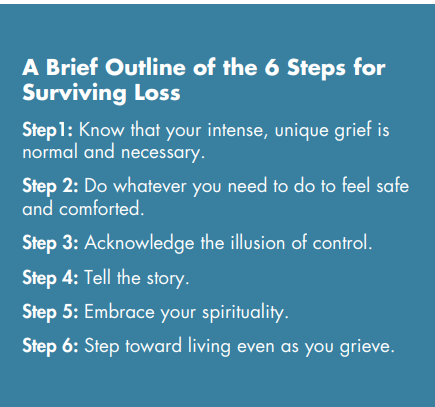 Q&A with Alan Wolfelt, Ph.D., director of the Center for Loss & Life Transition, death educator, grief counselor, author
Q&A with Alan Wolfelt, Ph.D., director of the Center for Loss & Life Transition, death educator, grief counselor, author
After a significant loss, it’s common for a person to feel like they’re going crazy. The sudden absence of a loved one is not only devastating but also disorienting. Alan Wolfelt, Ph.D., a leading death educator and grief counselor, understands that there is nothing more challenging than the early weeks and months of a major life loss. Time and again, a grieving person’s heart and mind returns to the impossible reality that can never again talk to or touch a person who lived and breathed and gave their life so much meaning. In his latest book, “You’re Not Crazy – You’re Grieving: 6 Steps for Surviving Loss” (Companion Press), Wolfelt answers the most common question he’s been asked over the years, as well as providing actionable steps to help individuals set out on a healthy path toward longer-term healing. Patti Martin Bartsche, interviewer
Where did the idea for “You’re Not Crazy – You’re Grieving” come from?
In my many years of counseling those in grief, the most common question I have been asked is “Am I going crazy?” So, I decided to pen a survival guide that addresses this question and assures people that they are not crazy, they are experiencing normal symptoms of grief.
Is it understandable to feel like you’re going crazy after the loss of a loved one?
Yes, it is normal to feel “crazy” after experiencing life losses. In this book I explore the various ways the griever may feel like something is wrong with them and assure them they can and will survive if they allow themselves to openly and honestly mourn.
“What do you mean by crazy?”
The word “crazy” is no longer considered acceptable in mental health circles. Rightfully so, it stigmatizes mental health issues and places blame and shame on those who suffer from mental health challenges. So, when it came time for me to write this book, I had a conundrum. “Crazy” is in fact the term I’ve heard many grieving people use most often to describe their own early, and sometimes longer-term experiences of things like shock, disorientation, protest emotions and more. Actually, they almost always use the word “crazy” to collectively label many of their grief symptoms.
The word “crazy” comes to us from the 14th-century Germanic word crasen, which meant “to shatter, crush, break into pieces.” Before that existed the Old Norse krasa, which also meant “to shatter.” If you pick up an old piece of fine china, you might see a web of fine lines on its surface. This is called “crazing.” The glaze, normally transparent and invisible, has shattered into tiny sections.
Grief can be equally shattering. It crushes us and breaks us into a million pieces. This experience tends to make us feel crazed for a while — weeks, months and sometimes even years. So, I decided to use the term “crazy” in this book after all. I agree it’s not an appropriate term for mental illness because it carries too much baggage and stigma. But grief, which is not an illness, often feels crazy in the truest sense of the word because it can shatter you, crush you, and make you feel like you have been broken into pieces.
Does it matter if that loss is sudden or anticipated?
While different circumstances of death can influence the grief experience, you can still feel crazy if the loss is sudden or anticipated. We cannot be fully prepared even when a death is anticipated. Why? Because it’s human nature to want and expect life to continue. We’re just not made to easily welcome death into our lives.
You have said the first year or two of grief is often unbelievably painful and confusing. Is this when the “craziness” is first felt … or can it be felt at any time during the grief process?
While the acute, early symptoms of grief initiate the experience of feeling crazy, grief naturally ebbs and flows, is recursive, and the feeling that something is wrong with you can occur long after the death. The griever is riding the waves of grief and “griefbursts” which I describe in the book can take place many years after a death.
How do those feelings of “craziness” manifest themselves? Is it more than just mood swings?
Crazy-making symptoms can include but not be limited to shock and numbness, dissociation and surrealness, trouble thinking, particularly short-term memory loss, time distortion, searching and yearning, insomnia, particularly early morning awakening, and generalized fatigue.
You have said that perhaps the most isolating and frightening part of a person’s grief journey is the sense of disorganization, confusion, searching, and yearning that often comes with loss. Can you elaborate on this?
It is that feeling as if you cannot get a grasp on anything and nothing makes loss. The griever can feel distant from what is happening around them which can be frightening. “It feels like a dream,” grievers often say. The disorganization results in short-term memory loss. Your mind is blocking, you are hearing but you cannot listen well. You may feel like you can’t get anything done and find it hard to concentrate long enough to get anything done. Add in insomnia and time distortion and you can see why the mourner is having a difficult time. We call it the “hard work of mourning” for good reason.
One of the most common questions you’re asked is, “Am I going crazy?”
What is your short answer? No, you’re not crazy, you are grieving. Now, allow me the honor of helping you understand what you are experiencing. The second half of the title of your new book is “6 Steps for Surviving Loss.” Can you provide a brief outline about these steps? The following six steps are a “how-to” of not only making it through the early months of early grief but also setting out on a healthy path toward longer-term healing. The six steps are based on my six central reconciliation needs of mourning, which I developed and have strongly advocated for throughout my career as a grief counselor and educator. However, because of the uniqueness of early grief, I created these six steps to help the mourner better understand what is being experienced related to potentially feeling crazy. Step1: Know that your intense, unique grief is normal and necessary. Step 2: Do whatever you need to do to feel safe and comforted. Step 3: Acknowledge the illusion of control. Step 4: Tell the story. Step 5: Embrace your spirituality. Step 6: Step toward living even as you grieve.

How did the pandemic impact the grieving process?
Specific to funeral service is that it resulted in a compromise to access a meaningful ceremony that is anchored in a “rite of initiation.” We have a “shadow pandemic” for a number of families … “a lingering grief that lacks integration of the loss into one’s life.” We have seen a number of people that have what I call “unembarked mourning,” where there is an incapacity to convert grief (“the internal response to loss”) into mourning (“the shared social response to loss”). For some people the potential result is fallout symptoms – anxiety, depression and a loss of sense of safety and security. I explore this topic more in my book, “When Grief is Complicated.”
Coming out of the pandemic, are there lessons to be learned about the need to grieve in healthy ways?
A huge lesson is the importance of how meaningful funerals help people meet the following functions: reality, recall, support, expression, meaning and reintegration into the community in a changed social status. As I always say in my WHY of funeral trainings, when words are inadequate you start with ceremony. When funerals are inhibited in any way, the mourner is essentially on hold. We are now faced with a need to help people impacted by the pandemic to do “catch-up mourning.”
What do you want readers to take away in reading the book?
I hope readers will understand they are not crazy, but they do have some special needs, too, that need and deserve their attention. I also want them to have hope that they can and will survive.
How can the book help funeral professionals better serve families? As funeral service staff familiarize themselves with the normalcy of the symptoms I describe in this new book. They will be able to help the families they serve know that they are not crazy, they are grieving and in need of support and compassion. •
CLICK HERE TO JOIN AFTERTALK
Free, Non-Profit and Non-denominational
We invite you to submit your thoughts, essays, poems or songs. Please send to info@aftertalk.com. To see past AfterTalk Weeklies, CLICK HERE
